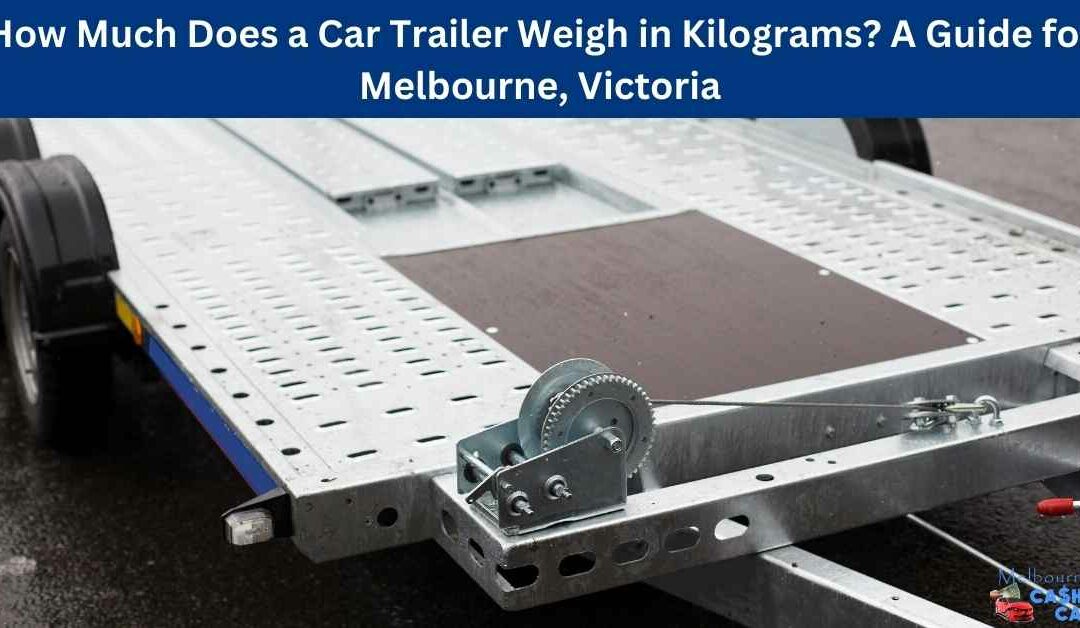If you’re in Melbourne, Victoria, and you’re considering getting a car trailer, one important question that might be on your mind is, “How much does a car trailer weigh in kilograms?” Car trailers are a convenient and versatile solution for transporting vehicles, whether it’s for personal or business use. Understanding their weight is crucial for safe and legal towing. In this guide, we’ll explore the factors that determine the weight of a car trailer and provide essential information tailored to Melbourne residents.
Understanding Car Trailer Weight:
Car trailers come in various sizes and configurations, which directly affect their weight. The weight of a car trailer is typically measured in two ways: its Empty Weight and its Gross Vehicle Weight Rating (GVWR).
- Empty Weight: This refers to the weight of the trailer itself without any additional load. It includes the weight of the frame, axles, wheels, and other structural components. The empty weight can vary widely based on the size, material, and construction of the trailer. Smaller, single-axle trailers will generally weigh less than larger, double-axle ones.
- GVWR: The GVWR is the maximum weight that a fully loaded trailer is allowed to weigh. It includes not only the weight of the trailer but also the weight of the cargo and any passengers. Exceeding the GVWR can be dangerous and is often illegal.
Factors Influencing Car Trailer Weight:
Several factors contribute to the weight of a car trailer, and these factors can help you determine the right trailer for your needs:
- Size and Dimensions: Larger trailers with more surface area and capacity will generally weigh more than smaller ones.
- Material: Trailers can be made from various materials such as steel, aluminum, or a combination of both. Steel trailers are usually heavier but may offer more durability, while aluminum trailers are lighter but may be less robust.
- Axle Configuration: Single-axle trailers have one set of wheels, while double-axle trailers have two. Double-axle trailers can distribute the weight more evenly and are often used for heavier loads.
- Features and Accessories: Additional features like ramps, winches, storage compartments, and spare tires can add to the overall weight of the trailer.
Read : Can an electric car tow a boat?
Localizing Information for Melbourne, Victoria:
In Melbourne, and indeed all of Victoria, regulations for towing trailers are outlined by VicRoads. It’s essential to adhere to these regulations to ensure safety on the road.
- License Requirements: In Victoria, your driving license type determines the size of the trailer you can legally tow. Generally, a standard car license (Category C) allows you to tow a single-axle trailer with a Gross Trailer Mass (GTM) of up to 750 kg. For trailers with a GTM of over 750 kg, you’ll need a higher license category or an endorsed license.
- Speed Limits: When towing a trailer in Melbourne and throughout Victoria, the maximum speed limit is 100 km/h on highways, 90 km/h on non-urban roads, and 60 km/h in built-up areas. These limits apply to trailers with a GTM of up to 4.5 tons.
- Safety Checks: Before hitting the road, ensure that your trailer is roadworthy. This includes checking the brakes, lights, tires, and any safety chains. Regular maintenance will not only keep you safe but also prevent accidents and fines.
- Parking and Stopping: When parking your car and trailer combination, be mindful of any parking restrictions. Oversized vehicles might have limitations on where they can be parked, especially in urban areas.
- Weigh Stations: If you’re unsure about the weight of your loaded trailer, there are various weigh stations around Melbourne where you can get an accurate measurement. This will help you avoid exceeding weight limits, which could result in fines or even vehicle impoundment.
Choosing the Right Car Trailer:
When selecting a car trailer in Melbourne, consider your specific needs:
- Intended Use: Are you towing a small car, an SUV, or a larger vehicle? Consider the weight of the vehicle you plan to transport.
- Frequency of Use: If you’ll be using the trailer frequently, invest in a well-built, durable option. If it’s for occasional use, you might consider a lighter model.
- Regulations: Make sure the trailer you choose complies with VicRoads regulations, and ensure your driving license permits you to tow it.
- Budget: The price of car trailers can vary significantly based on their size, features, and construction material. Set a budget and stick to it while prioritizing quality and safety.
Read : Can a company gift a car to an employee Australia?
In Conclusion:
Understanding the weight of a car trailer is essential for safe and legal towing, whether you’re driving around Melbourne or anywhere else in Victoria. Make sure to choose a trailer that suits your needs, complies with local regulations, and is within your vehicle’s towing capacity. By following these guidelines, you’ll be on your way to transporting vehicles safely and efficiently across Melbourne’s vibrant streets and beyond.
If you are in Dandenong, Victoria 3175, and looking cash for cars Victoria or cash for damaged cars, below is the best way to visit us.
Contact us at
Melbourne VIP Cash For Cars
Unit 3/2 Lace St
Eumemmerring VIC 3177
(03) 9067 7578

